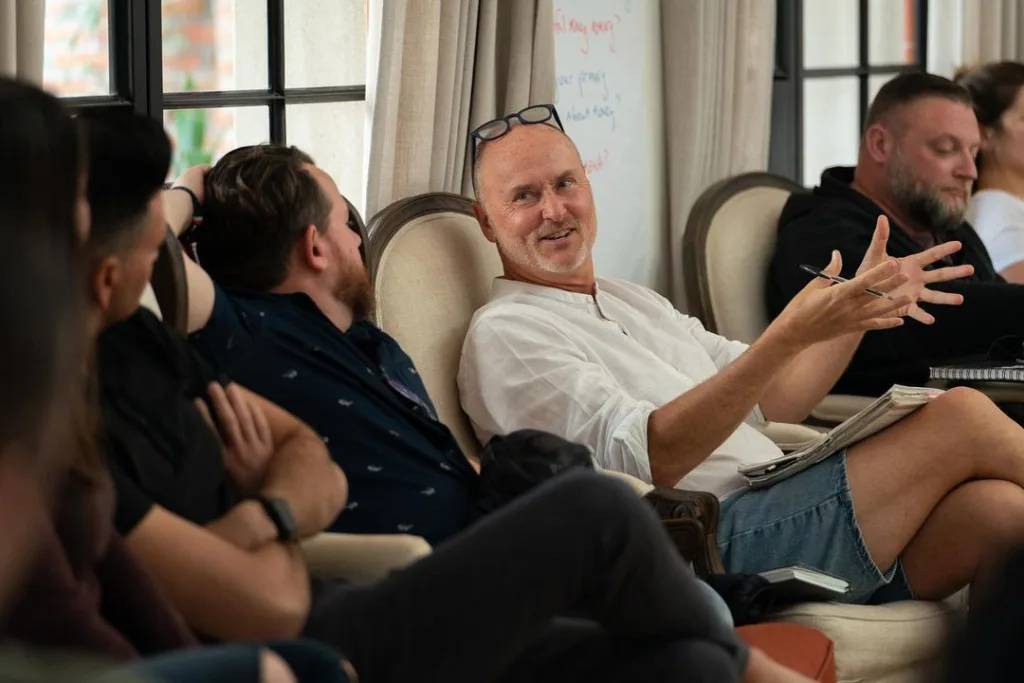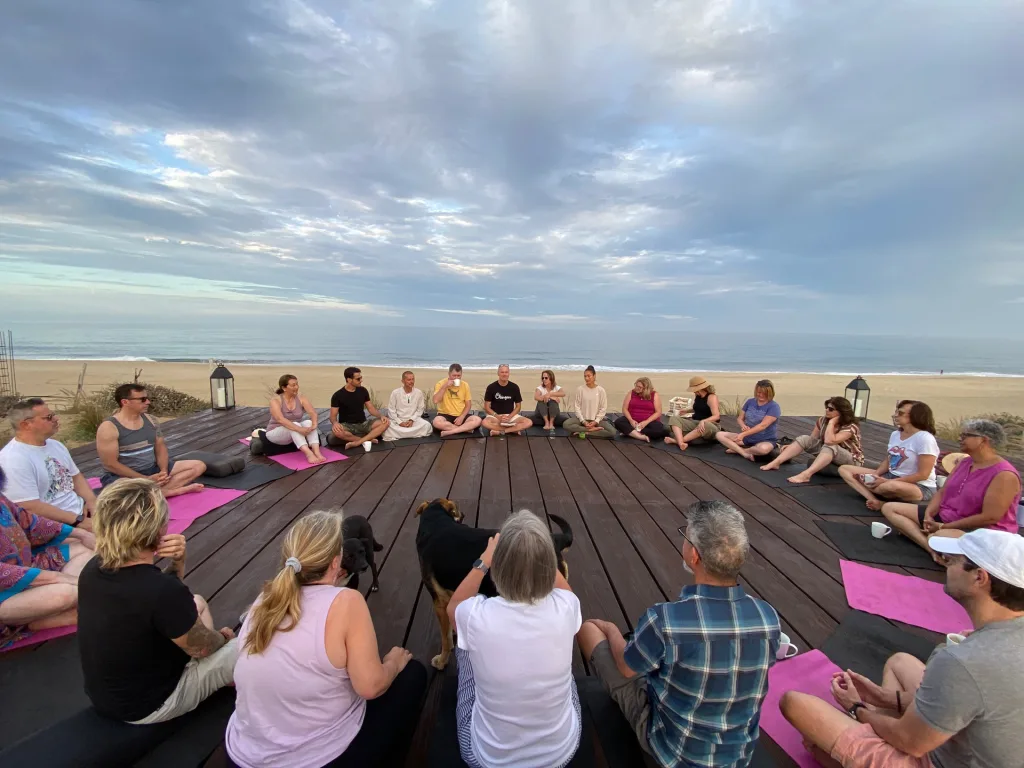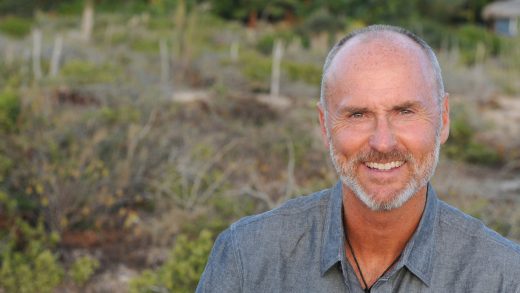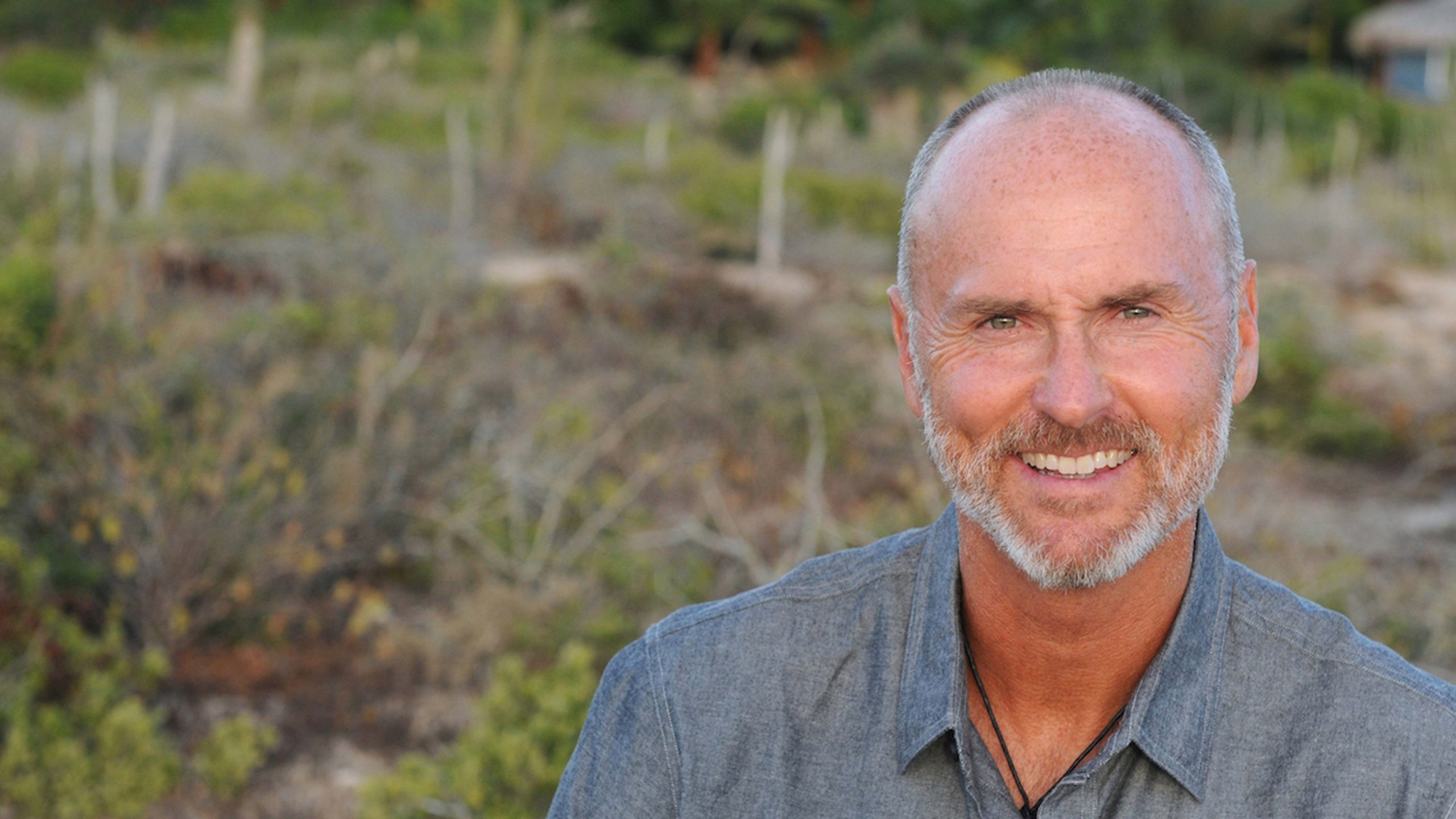The one question you need to cultivate wisdom from Chip Conley’s Modern Elder Academy
April 19, 2024
The one question you need to cultivate wisdom from Chip Conley’s Modern Elder Academy
Author and Modern Elder Academy founder Chip Conley shares four pathways to discover your purpose and the statement that helps him fulfill his.
BY Jenna Abdou
Early in my research about Chip Conley, I heard him share a perspective that stopped me in my tracks. Invoking Father Richard Rohr’s insight, he shared that we spend the first half of our lives serving our ego and the second half serving our soul. For weeks, I couldn’t stop asking: How can I start the second half sooner?
Purpose is the theme that drew me to Conley’s work as founder of The Modern Elder Academy (MEA), “the world’s first midlife wisdom school.” He previously founded Joie de Vivre, the second-largest operator of boutique hotels in the U.S., and served as Airbnb’s head of Global Hospitality and Strategy, where he was known as the Modern Elder.
Today, his mission is reframing midlife “as a chrysalis, not a crisis,” a topic he explores in his latest book: Learning to Love Midlife: 12 Reasons Why Life Gets Better with Age. MEA is rich with stories of people in midlife who altered their career paths in pursuit of their purpose. The more stories I heard, the more eager I was to ask Conley how we can begin our life’s work now and avoid career regret later.
“Ask the following question: ‘Ten years from now, what will I regret if I don’t learn it or do it now?’ The reason that’s an important question is because anticipated regret is a form of wisdom,” he shares. “At any age, asking—what will you regret 10 years from now?—will help you get clearer on what you can do now to avert that regret. Whether starting a business, changing a career, or living in a different place, it helps to crystallize one’s sense of: ‘I need to catalyze myself to do this now.’”
In our conversation, he shares four pathways to discover your purpose, his most beneficial wisdom practice, and how he leads a regenerative life.
You’ve shared that: “As a for-profit entrepreneur, I spent the first half of my career focused on return on investment (ROI). Now, I’m spending the second half focused on a different form of ROI: ripples of impact.” What daily questions and commitments do you hold yourself accountable to to catalyze the latter?
There’s a statement from developmental psychologist, Erik Erikson: “I am what survives me.” I think about that a lot: What will survive me? I don’t mean my name on a building or me writing a book, but the interactions I have on a daily basis. I love the movie, It’s a Wonderful Life [with] Jimmy Stewart as George Bailey. Clarence (the angel) shows him what his little town would have been like if he never existed.
I wish we all had that ability to see what the world would be like without us. It doesn’t have to be big things. It’s what people would say about you [in] your eulogy. For me, the practice I’m constantly thinking about is: How am I in service? So, my statement is not: I am what survives me. It’s: I am how I serve. I do [the same] three prayers and six mantras every morning in the shower; Those are all about preparing me for the day where I’m in service.
Is there a mantra you’re open to sharing?
I’m lovable for who I am, not what I do.
Our generations are asking similar questions about purpose. Let’s imagine you’re my mentor and we have, as you share, a symbiotic intergenerational relationship. What questions and experiences might we explore to support each other in discovering or fulfilling our purpose with greater intention?
I think there are four pathways to purpose. These are the shorthand ways to get there. Purpose will often come from something that either excites you, agitates you, makes you curious, or something from earlier in your life that feels neglected, but you felt passionate about. The advice I would give to anybody, at any age, around purpose is first of all: Don’t get performance anxiety around purpose—”everyone has a purpose and I don’t”—as if it’s a BMW. Purpose is not meant for comparison. Secondly, focus on [the] “small p’ of purpose, not just [the] “big P” of purpose; The “small p” of purpose are the smaller things in your life that are meaningful, but aren’t the things that people necessarily note about you.

There’s a woman who was recently at MEA. She hated her job as a litigation attorney. She realized [in a workshop]: When I was a kid, I loved baking pies with my grandma. She had dreams about it while she was in Baja. At the end of the week, she decided: I’m going to keep being a litigation attorney for a little while. And, I’m going to go to pastry school and become a pastry chef. Then, if I like it, I’m going to start a bakery in my neighborhood. That’s a good example of someone tapping into a purpose that was a bit of a surprise because it was about something from childhood that had been somewhat dormant. To me, that is a real opportunity.
This question made me pause in your book: “Are you willing to take a gap year, at minimum, once per decade, until the end of your working life?” What clarity do we gain when we step away that we can’t access otherwise?
I took one in my early 50s, two years actually, between Joie de Vivre and Airbnb. I believe in order to change your habits, it’s helpful to change your habitat. That’s why I think MEA workshops are helpful. It doesn’t mean you have to move there. It just means that you need to be in a different space where things are a little foreign to you.
Similarly, the value of a gap year allows you to potentially get out of your home—and be on the road or go live somewhere for six months—and give yourself a different perspective, so your brain isn’t conditioned to look at the world in a certain way. You create space in your life and things emerge. When we’re living our normal lives, we’re on a treadmill. There’s not a lot of room for curiosity.
Curiosity is the taproot for creativity and innovation. So, we’ve got to stoke our curiosity. But, curiosity is not an efficient thing. A lot of times, people don’t have time for curiosity. But, when you’re doing a gap year, you have time. You also have time for your emotions to catch up with you. For some of us who are [occasionally] workaholics, we try to outrun our emotions.

The value of having your emotions catch up with you is that it helps you get more conscious about: How happy are you. How much meaning do you have in your life? What is something that needs to get repaired from the past that you’ve been neglecting? That’s not a bad thing, especially if you’ve got tools, resources, and people to support you. I actually wrote a post on the value of a midlife gap year today, and that you could potentially do it for less money than you are currently spending.
There’s another great quote in the book: “The idea of a regenerative lifestyle is based upon the idea of both adopting new growth in your life while learning to let go using discernment of what no longer serves.” In the last year, what is one area that you’ve grown in your career and what is one part you’ve let go of?
I have let go of this deep need to be the hero; This sense that ‘Chip has to do it.’ I’m more open to collaboration. So, what I’ve put to bed is this idea that I’m the rugged individualist who will get it done.
What I have welcomed into my life, as a new frame for looking at things, is: How do I take time off more frequently? One of the things I learned from COVID is I put on my calendar—three hours a day, three days a week—spying on the divine.
I love this—The awe walk.
Yes. I worked during the weekend, but I also got a 90-minute massage. I did cryotherapy, went for a long hike, and did an extended meditation. So, how do I schedule my regeneration time so I don’t wait until I’m burned out and need a week or month off? It’s actually in my calendar every week.
Every weekend for decades you’ve written down what you’ve learned in your Wisdom Book. Of that wisdom, what have you learned is most essential in cultivating good discernment?
If there’s one tool I can point to that has accelerated my wisdom, but also made me a better human, this is it. The number one thing I’ve learned is not a particular tool or observational insight, other than: If our painful life lessons are the raw material for our future wisdom, metabolizing our experience—making sense of that raw material—and trying to learn how it will serve us in the future is essential. I wrote a book, Emotional Equations….

Yes, “Disappointment = expectations – reality.”
Yes, and there’s also Despair = suffering – meaning. Meaning and despair are inversely proportional. When you’ve had a painful life lesson, a lot of people walk away from it like: I don’t even want to think about that. You should actually do the opposite because there’s something to be learned there. Once you’ve learned the lesson, it gives you a sense of meaning like: This is going to serve me in the future. The number one thing I’ve learned is the process of: How do we make sense of our experiences on a weekly basis? With my leadership teams, I do it quarterly. It’s a beautiful practice having people come to the group and say, “This is what I learned in the last quarter and how it’s going to serve me,” because we’re actually [then] sharing our wisdom. Most importantly, the last thing we do is say: What was our team lesson? Sometimes, there’s two or three competing ones, but the fact that we get to talk about that is hard. You can’t do this well if you don’t have a very functional team, but it’s a way to create one.
You write that “The ultimate middle-aged skill is knowing what you want from life. Once you know what you want from life, you are better able to give back to life.” Let’s close with your reflection on this and one question we can ask ourselves about how we might give back in our own way.
David Viscott has a quote: “The purpose of life is to discover your gift. The work of life is to develop it. The meaning of life is to give your gift away.” I think the most important thing around how we are serving in the world is to start with: What is our gift that we are supposed to develop in this lifetime, then share with others? So, any program, whether it’s MEA, a book or mentor who is your confidant—the person who gives you confidence—is a gift for you to get clearer on what you’re supposed to be offering the world. That’s the most important thing we can do in our lifetime.
ABOUT THE AUTHOR
(24)



